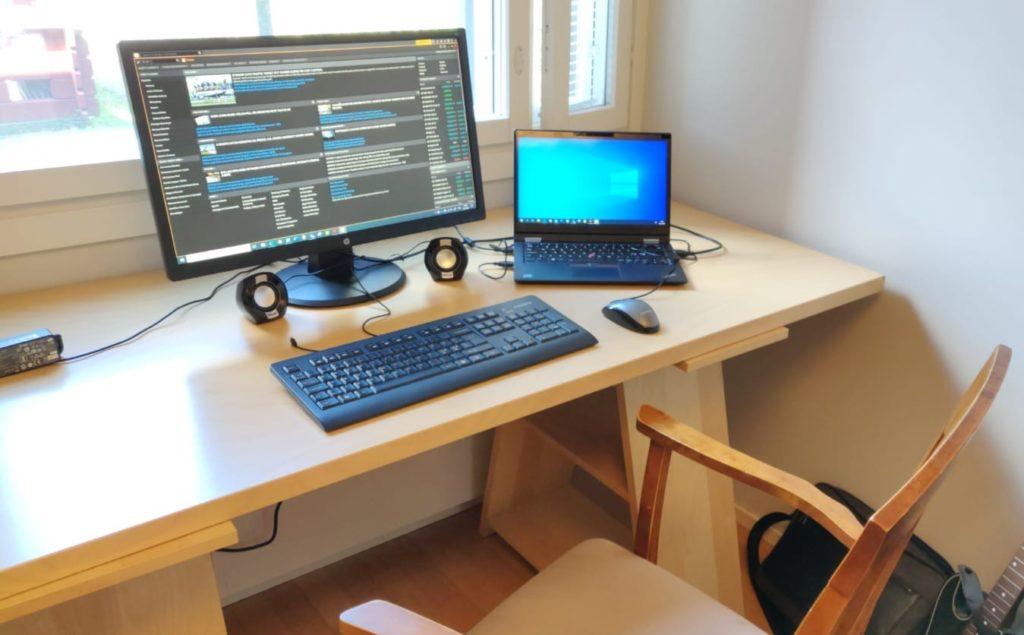May 18, 2020
A virtual due diligence? Is that even possible?
I have not done the math, but I am quite sure that my team of investment analysts do most of the traveling at Finnfund. In essence, we help investment managers in deal preparation and execution by developing financial projections, conducting market analyses, and gathering vital information on customers, industries, and operating environments. A crucial part of every investment process, due diligence (DD) is always conducted by visiting the potential investee company in its home country. While on site, we meet with all relevant stakeholders in person. This results in long days filled with local site visits and face-to-face discussions, but also valuable time in between official meetings – a fact that I only recently came to grasp the value of.
All travel is canceled, but the need for investments is not

Home office
In March, our normal working routines changed in a dramatical fashion – suddenly we could not simply board a plane. My calendar had been quite packed with upcoming DD trips to locations in both Africa and Southeast Asia. What now? The need for investments has not disappeared – on the contrary, financing is needed now more than ever in our target countries. In addition, 20 prominent academics and leaders recently announced a call for action to European governments, highlighting the fact that over 20 million jobs may be lost in Africa alone. At the same time, it seems that foreign investments in Africa are slowing down.
In the current situation, there is no question about the importance of our work – and where there is a will, there is a way. This is also how I understood what it means to work for a relatively small and highly agile organization in practice. Even if we de facto think that a personal visit is necessary, we also have a strong intention to find ways to keep making investment decisions. Our Investment Committee looks at each investment on a case-by-case basis and decides whether we can conduct the DD process virtually or if we should wait until traveling is possible again. We do our best to look for practical solutions and adapt to the prevailing situation, even if it means going the extra mile.
Also, the past months have given us valuable insights on how to ensure the quality of a virtually conducted DD. In the following, I will share some of my personal reflections with you.
Choose your platform. Many organizations have strict restrictions when it comes to using different remote meeting technologies and applications. Having said this, make sure that everyone is comfortable with the technology platform of choice.
All business is people business. It should be kept in mind that a DD is very often the start of a long-term relationship between the financier and the investee company. Building mutual trust and understanding can be challenging in virtual meetings. Of course, I can do a deep-dive analysis of the financial statements, but they only demonstrate historical financial performance. What I am particularly interested in is the future – how does it look like for the potential investee company? What are their plans ahead? Meeting with top management provides you with the possibility to grasp the tangible reality behind figures and written documents – and to understand the soul of the company. I would say that this is very difficult and almost impossible to achieve in a virtual setting. When on a remote journey, think about the things you would look for while on site in person and try to find ways to do this virtually.
Focus on the agenda. Do not send lengthy invitations for the entire day, since not everyone will be attending all of the virtual sessions. We have had between 15 and 30 people attending the virtual DDs, and most sessions need to be arranged for a smaller group than that. Check the agenda in advance and send separate invitations for each session so that everyone can join the ones they find relevant. Arrange regular calls with your own team to have time for mutual reflection. When scheduling the overall agenda, allow a couple of hours or even half a day for ad hoc meetings as there might be a need to discuss some topics in more detail.
Clean your calendar. Communicate with your colleagues and clients so that they know that you will not be available for the duration of the DD meetings. Even if you are not traveling, you will be busy for most of the day. Virtual DDs usually last for a normal work week.
Be active. In face-to-face meetings, everyone can see that you are listening and paying attention to the conversation. However, in a virtual meeting, people might forget about you if you do not say a word. While observing is vital, make sure to actively participate in the discussion from your own device – and keep your camera on for a more personal experience.
Find time for informal meetings. Very often, informal one-on-one discussions outside of the official agenda provide you with relevant information and honest insights that would not otherwise be covered. Possibilities for more relaxed encounters are very limited in virtual meetings so arranging separate calls with key people is worth the extra effort.
Your brain needs breaks. This might sound mundane, but you actually need to allow yourself time for thinking in between meetings. Keep track of the time and do not let meetings run over breaks and lunch. I was expecting the remote meetings to be long and intense, but little did I know – the virtual meetings took even more time and were even more intense than I had anticipated. Why is that? In comparison to a standard DD process, we try to compensate for the lack of personal presence with even more meetings and pre-readings than usual. Prepare for lengthy and packed days filled with new information and mental processing – and remember to keep breaks.
How about the future?
While we are doing our best at the moment, I cannot help but think about the future. Traveling takes time, causes emissions, and costs money, so replacing on-site DDs with virtual ones would appear rather beneficial. Will we keep conducting DDs virtually even after it is possible to travel again? From where we stand right now, the answer is a no. Although a virtual DD might be doable with people we already know and with companies we have visited earlier, it is never the same as a proper site visit.
This is particularly true when it comes to projects that involve new people and new companies, not to mention new countries or industries – you simply cannot replace local visits with online meetings. We will continue to carefully consider alternative ways to conduct DD processes for each project and see if a virtual one might be possible. Travel limitations will most likely be in place for quite some time still so all lessons learned in the past months will be highly valuable in the future.
A whole new area of consideration is the need for a locally conducted environmental and social due diligence, which is a key part of our investment process. Finnfund’s mandate is to finance companies in challenging environments where, for instance, the state is often not capable of ensuring the realization of universal human rights. Therefore, understanding our operating environments and their deeper contexts is a key element in assessing and monitoring responsibility. How can this be done if we cannot be there to see, learn, and confirm? My colleagues in the sustainability team have promised to share their thoughts on this topic in a blog post shortly.
Hanna Kauppinen
Investment Analyst
To read more:
Coronavirus underscores the need to invest in resilience
Comments
Comments are closed.

Well written article!
If you need support in due diligence in Vietnam, I am available in Hanoi. After 10 years in Vietnam I have good understanding of forestry sector here and contacts to stakeholders including forest industry associations, Vietnam Forest Owners Association, and the government.
With rapidly growing wood industry there is demand for financing investments in upgraded technology, forest certification, forest management planning, corporate responsibility. Vietnam has around 1,3 million forest owners and some 4000 biggish forest industry companies.
Thank you for your comment! We have forwarded your contact information to our staff members responsible for forestry investments.
Well said